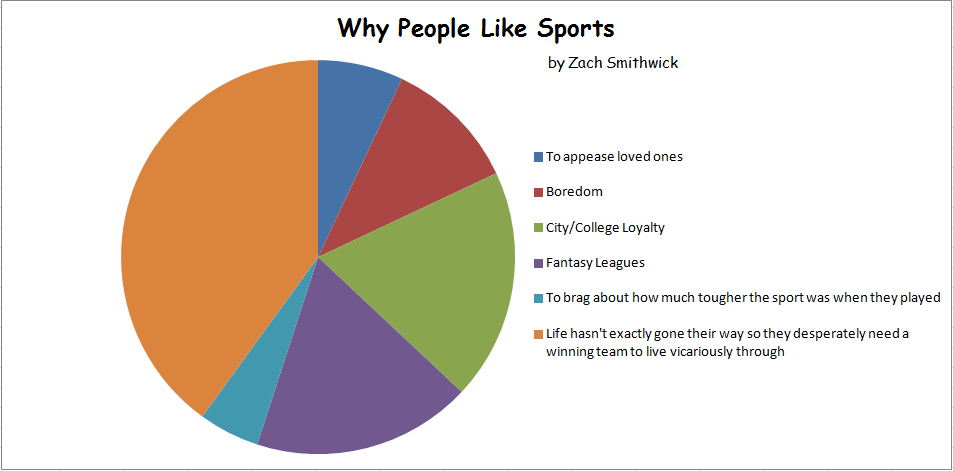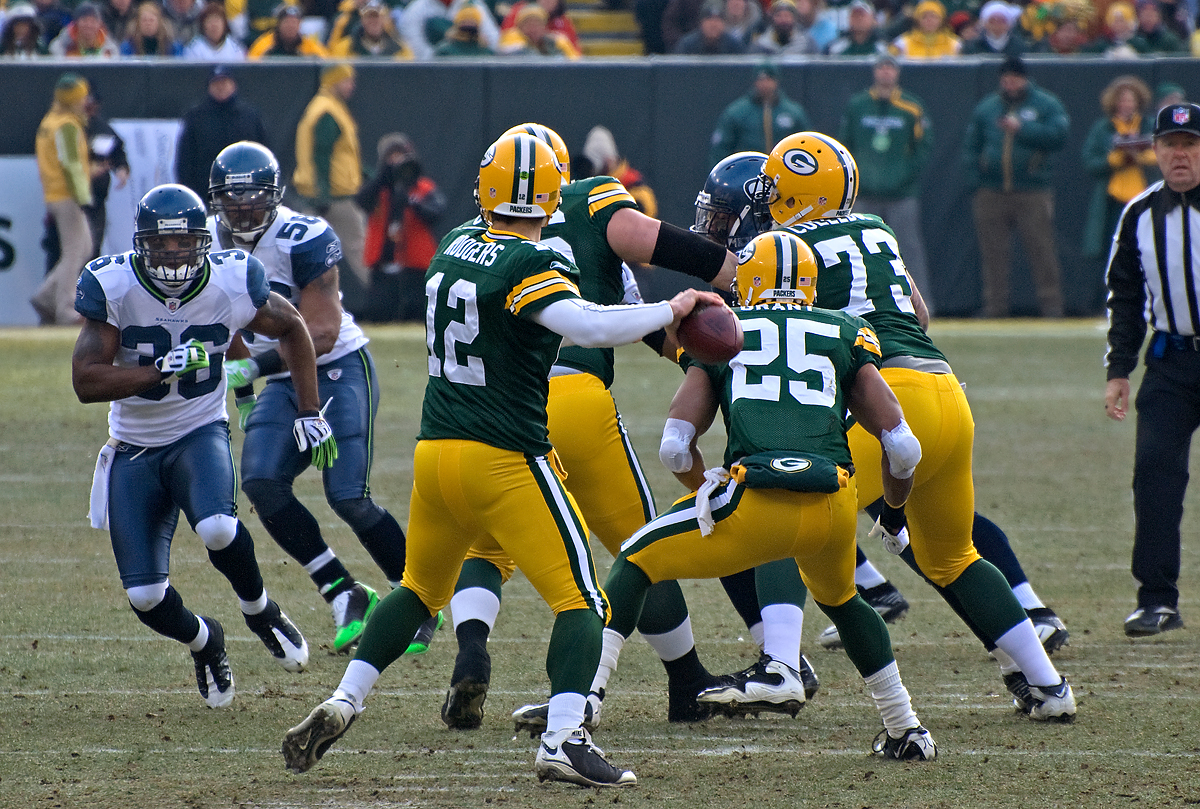Editor's note: this post got pretty long, so I decided to throw baseball into it's own article...stay tuned.
People like sports. They are exciting to watch, fun to follow, and offer great small talk fodder with people whom you have little in common.
For a graphical view of why people like sports, consult the image below:

I can only assume that Georgia Tech's weak fan base is due to the fact that their alumni are so successful that they don't need sports to live vicariously through
While some people may just watch sports purely to see great athletes in action, most people have varying degrees of emotional investment in their favorite sports. These emotional investments cause them to want one thing: to see their team win it all and be proclaimed "champions".
If you are a believer in fairness and equality, then you will want to see the team that is truly the best proclaimed as the "champion", and not some team that just got lucky.
Have you ever felt that your team was truly the best, yet somehow they didn't win it all? Of course you have. Well, the good and bad news for you is that you may not be wrong.
The Many Ways of Determining a Winner
Playoff Tournament
The methods of crowning a champion vary with different sports, but here in America we are quite fond of a "playoff" system.
In a single-elimination playoff tournament, the winner gets to keep playing and the loser goes home. A benefit of a playoff system is that after each round, half the teams are eliminated, which means that the number of rounds needed to decide a winner (and the number of games that each team must win in order to be crowned the champion) is equal to  , where
, where  is the number of teams. For this to work evenly,
is the number of teams. For this to work evenly,  must be a perfect power of 2. If it is not, then some teams will get a first-round bye. Since the number of rounds varies with
must be a perfect power of 2. If it is not, then some teams will get a first-round bye. Since the number of rounds varies with  , a playoff system is an efficient way to determine the champion among a large pool of teams.
, a playoff system is an efficient way to determine the champion among a large pool of teams.
The method by which matches are chosen for each round depends on a team's seeding, i.e. how good they are said to be. For the early rounds, the best teams are pitted against the worst teams, so if all the higher seeds win then the championship game will be between the two best teams in the tournament.
A playoff system is...kinda fair. Each team has a chance to win the entire tournament, and teams that are seeded higher (usually through merit of past play) have an advantage due to the seeding system.
The problem, however, with a single-elimination playoff system is that it completely neglects a statistical average. Upsets (where a lower ranked team beats a higher ranked team) do happen, but just because a lower ranked team wins does not mean they are a better team. Sports can be notoriously streaky. Sometimes an otherwise good team simply has an "off day", and allows a worse team to defeat them. Sure, on that particular day the worse team was better, but if given a larger pool of games, the better team would surely win most of the time.
The downside of a playoff is that the best team may be knocked out of the tournament by a fluke loss, and the eventual champion would not actually be the best team. Many people can argue that this makes playoffs exciting, and it does, but we must ask ourselves if we want excitement or fairness? If you choose the former, then don't complain when your team loses.
Round Robin Tournament
In a Round Robin, each team in a pool of teams plays every other team in the pool. The champion of the pool is the team that has the best record at the end.
The main benefit of a Round Robin is that it is technically more fair than a playoff system. Since each team plays every other team, they all have an even "strength of schedule", and since the champion is determined by the total number of wins versus losses, a fluke upset can be overcome with overall good play.
The main downside of a Round Robin is that the number of games that each team must play is equal to  , which means that it varies with
, which means that it varies with  rather than the playoff's
rather than the playoff's  . If the pool of teams is large, then the number of required games could be excessive.
. If the pool of teams is large, then the number of required games could be excessive.
The other big downside of the Round Robin is that it is possible (and likely) that the champion will be determined before the end of the season. It would only be by pure coincidence that the two best teams would play each other in the final game of the season to determine a winner. This obviously makes a round robin less exciting than a playoff, and since sports are such a huge moneymaking endeavor worldwide, the various sponsors of sports would not very much like it if people stopped tuning in because the only remaining games didn't matter.
To that effect, there will necessarily be many games at the end of the season between teams that have no hope of winning the championship. Other problems include that even though a round robin is technically fair, there is also the possibility that the best team could lose simply because they had to play the other best teams around the same time, making their schedule slightly harder than the rest. In a single round robin (where the teams play each other once), there would also be an inherent unfairness due to "home" and "away". This can be mitigated in a double round robin, where teams play each other in their respective home fields. If the pool of teams is odd, there is also a very slight chance that each team finishes with an even record, making a determination of the winner extremely difficult, if not impossible. This is somewhat mitigated with an even number of teams, although tying records between teams are still possible.
Is Your Sport Fair? A Study
I'll now dive into several sports and determine if their method of choosing a winner is good or not. If it is not, I'll propose a different strategy. The important thing to remember is that some sports themselves are not exactly "fair" when it comes to actual gameplay, which I will explain in more detail per sport. For any sport, there is the possibility that the winner of a single game may not actually be the better team (which makes sports exciting), but it turns out that the ruling/scoring systems in some sports are much more fair than others.
American NFL Football
I'll kick things off with the most popular spectator sport in America. The NFL consists of 32 teams (a nice perfect power of 2) which are divided into two conferences (AFC and NFC), with each conference consisting of 4 divisions of 4 teams each.
The current way the NFL decides a champion is as follows: each team plays a 16 game regular season, consisting of a double-round robin with the 3 other teams in their division, plus a somewhat random assortment of games with other teams in the league. The winner of each division is the team with the best overall record in their division. Division champions get an entry into a 4-round playoff, and the two teams in each conference that have the best records (other than the division champions) get a "wild card" entry into the playoffs. In total, 12 teams make it to the playoffs. Since 16 teams would be required for a complete 4-round playoff, the top two seeds of each conference get a first-round bye.
Right off the bat, you should be able to tell that this system is inherently unfair. Playing a double round robin with other teams in the division should give the best team in that division...except the division champions are determined by overall record, not division record. Furthermore, divisions are chosen mostly by geography, so it is possible that one division will be much better than others.
The wild card is in place to mitigate this, but wild card teams have a harder time since they have to play an extra playoff game, so if you are second place in a really good division then you are going to have a much harder road to the final than a first place team in an easy division that gets the second seed (and a first round bye). Also, on the off chance that all four teams in a division are stellar, then the 4th place team in that division won't even get to go to the playoffs, even if they are better than the division champion of a different division.
Now, there are so many ways to do this better, which leads me to think "what the hell has the NFL been doing?" If we wanted to do a full round robin, then each team would need to play 31 games. Assuming one game per week, and probably several bye weeks, you'd be looking at a season that lasts from the first week in September to early April. Now, this is only about a month and a half longer than the usual football season, but people would probably lose interest at some point, especially if one team won it outright well before the season was over.
Since people like the super bowl (which means advertisers like the super bowl), let's not get rid of this great American tradition. Since there are already two conferences, let's just do this: the teams in each conference play a round robin (15 games per team), and then the champions of each conference play in the super bowl (a one round playoff). Boom! 16 total games (4 less than a wild card team would need to win the super bowl in the current system), and a more or less fair way of determining the winner. Still some ambiguity due to the conferences being arbitrary, but definitely better than the current system. Don't like a single game playoff? Fine, take the top two teams from each division and do a two round playoff. I prefer, though, that there aren't an excessive number of playoff rounds, as it reduces the importance of the regular season.
American College Football (FBS, a.k.a. the one that people care about)

We did this a lot last season
Image Credit
Ah, my favorite sport besides pro tennis. Now, the unfairness in college football has been well documented and complained about, so I'll just give a brief run down. Teams are divided into conferences (again, based mostly on geography), and they more or less play a round robin with teams in their conference, along with a few games between teams of other conferences. Teams are ranked on a national poll (the BCS), a mystical system that no one really understands, but if their team doesn't end up on top then they will relentlessly swear that it is wrong. Each conference ends up with a champion (for some conferences a championship game is used to determine this) but the conference champions get no more than bragging rights if they aren't ranked highly enough in the national poll.
Now, up until a few years ago, only the top 2 teams in the national poll were chosen to play in the championship game. After much complaining, it has now been changed to the top 4 teams, resulting in a 2 round playoff (which people still complain about, so I see 8 teams in the future). Just an aside, for everyone who complained that "college football needs a playoff" in those crazy pre-2014 days, technically speaking college football did have a playoff, it was just a single round. Have fun correcting your friends.
While the college football system is inherently unfair, the thing I like about it is that the lack of a robust playoff makes the regular season matter. In most other sports with multi-round playoffs, a team can suffer several losses in the regular season and still win it all. In college football, every game matters, and that makes the regular season pretty darn exciting. It also rewards good regular season play, in other sports having a stellar regular season almost does more harm than good, as it means that the team could have taken it easier to save energy for the playoffs.
In a way, college football is a fairly good analogy for life. If you are born into the wrong conference, then you can make some noise, get some attention, but you'll never be able to win it all. But if you are born into the right conference and are able to vanquish your opponents, then the crown is yours.
NBA Basketball
The NBA schedule consists of 82 games in the regular season with a 4 round playoff to determine the winner. This is...overkill.
With only 30 teams, there could be a triple-round robin between all teams in the league in 87 games, just 5 more than the current season (and far fewer than if a team went to 7 games in each playoff round). This would be a pretty fair way to determine a champion (although people would still like to see a championship series).
Overall, basketball is a pretty fair game. Since it has a large amount of scoring, the effects of a single mistake are mitigated, meaning that the winning team of a single game is probably the better team.
I just wonder...why on earth does the NBA have a 4 round playoff? Even with the current system (which I didn't care to look up how they schedule opponents), the final records of each team should be a pretty good estimate of who is the best. Why not just pick the top 2 teams and do a single championship series? Why do more than half the teams in the league need to make the playoffs? It's pretty much the opposite of college football.
In this past season, for example, Golden State had a record breaking regular season, but it was obvious that when the playoffs came around they were spent. The first three rounds of the playoffs were pretty much just a formality, since everyone knew it would be Golden State vs. Cleveland in the finals. One can only wonder if the finals would have ended differently had Golden State and Cleveland gone straight to the finals instead of having to play 3 rounds prior.
NHL Hockey
I'm from Georgia so I don't care enough about hockey to think about how it could be better. I'll leave that as an exercise to my Canadian readers.
ATP Tennis
My favorite professional sport, so I had to include it. The tennis season is separated into many tournaments that players can enter as they choose (if they qualify for them). Each tournament is a single elimination playoff. The smaller tournaments usually have 5 rounds (32 players in total) and the larger "Grand Slam" tournaments have 7 rounds (128 players in total). An exception is the ATP world tour finals, which takes the top 8 players in the world and does a round robin with two groups of four followed by a 2 round playoff.
Since tennis has to deal with a large number of players, a playoff is pretty much the only way to go. While the playoff has its drawbacks, tennis is one of the few sports in which it is actually structured correctly. All American sports are separated into two arbitrary leagues/conferences, meaning the championship game may very well not be between the two top seeds (assuming all top seeds win). In tennis, the #1 seed is the player in the tournament with the highest world ranking, the #2 seed is the player with the second highest ranking, etc.
Like basketball, tennis is a pretty fair game (except for maybe the tiebreak system). Since tennis consists of a large number of equally weighted points, the effects of isolated mistakes are minimal. Due to the scoring system, each player gets, in essence, three "mulligan" points per game. For example, Roger Federer has shown exceptional dominance in the game of tennis, and is widely considered to be the greatest of all time. Based on his player stats, I was able to infer that he has won in the ballpark of 60% of the total points he has played. That may not seem like a lot, but in the sport of tennis it is a wide enough margin to determine a winner.
Further, since tennis is separated into many tournaments, a fluke loss by a player (such as what happened to Novak Djokovic in this year's Wimbledon) doesn't ruin their season. Sure, some tournaments are more important that others, but players still have many chances to win.
Golf
Golf is a weird sport with some inherent ambiguities, but all in all its tournament structure is pretty fair. Players play the same course over four rounds and the player with the lowest score at the end is the champion.
The only thing slightly unfair about golf (other than the fact that a really bad shot can potentially ruin your entire round) is that players will necessarily have to play the course at different times of day. This has an effect on the temperature, the location of the sun in the sky, and, most importantly, the wind. Aside from mental toughness, nothing has more of an effect on a golf shot than the wind. A player that plays the course when winds are calm will have a significant advantage over a player that plays during a hurricane, all else equal.
After the second round of a tournament, the leading players usually tee off last. It depends pretty heavily on location and time of year, but in general winds tend to be calmer during the early morning and peak around early-mid afternoon...right when the leading players would probably tee off. In that sense, golf may be inherently communistic, as it could be giving a disadvantage to leading players. During the final round, though, leading players have the advantage of playing last, since they know what they have to do in order to win. Many players may not let the performance of other players influence their game, but it is still an advantage.
Perhaps instead leading players should be given the option to choose their tee time. If a player is more of a morning person, then they may prefer to tee off early (or if they checked the weather and found out the winds would be more favorable early). This probably won't happen since having the leaders tee off last makes things more dramatic for the tournament...and boy oh boy, does golf need drama.
Major League Baseball
Good lord, the laundry list of issues with Major League Baseball was much too long to include in this already long post, and ended up being a fairly intensive research study done by yours truly (I love an excuse to make a massive spreadsheet).
Get ready to have your mind blown.





Pingback: Statistical Analysis for Why Baseball Should Not Have a Playoff
Pingback: [Video] How to Lose In The Playoffs